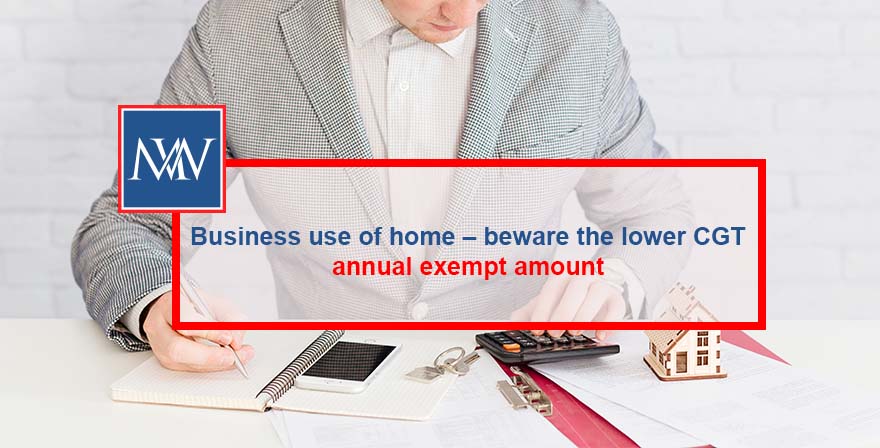
Business use of home – Beware the lower CGT annual exempt amount
The main residence exemption applies for capital gains tax purposes to the extent that a property is used as the taxpayer’s only or main residence. Where a property is used partly for business and partly as a residence, the relief only applies to that part which is used as a residence. The gain relating to the business part is liable to capital gains tax.
Often, in the past, this was not an issue as the annual exempt amount was sufficient to shelter the gain attributable to the part used for the business, particularly where the property was jointly owned. However, the capital gains tax annual exempt amount is being reduced and this may cause problems.
Annual exempt amount
The annual exempt amount was set at £12,300 for 2022/23 and was due to remain at this level for the next few years. However, this has now changed. The annual exempt amount has been reduced to £6,000 for 2023/24 and will fall again to £3,000 for 2024/25.
The reduction means that where a couple sold a property in 2022/23, they could potentially realise a gain of £24,600 on a part of the property used exclusively for business purposes without triggering a liability to capital gains tax. However, by 2024/25, this will have fallen to £6,000.
Case study
Jane runs her beauty business from home and uses a room exclusively for her business. The room accounts for one-tenth of the floor area in her home.
Jane is planning to sell her home and expects to realise a gain of £100,000. Had she sold the property in 2022/23, the gain attributable to the business part of £10,000 (1/10 x £100,000) would have been covered by her annual exempt amount of £12,300 and there would not have been any tax to pay. However, if she sells her home in 2023/24, only £6,000 of the gain will be exempt. If Jane is a higher rate taxpayer, she will need to pay tax of £1,120 on the balance (£4,000 @ 28%). If the sale does not take place until 2024/25, only £3,000 of the gain will be exempt and she will pay capital gains tax on the remaining £7,000 – a bill of £1,960.
The gain must be reported and the tax paid within 60 days of the date of completion.
Timing
Where a sale is on the cards and it will trigger a gain on the part of the property used exclusively for business, where possible complete in 2023/24 rather than in 2024/25 to benefit from the higher annual exempt amount.
Non-exclusive use
Depending on the nature of the business, it may not be necessary for an area to be set aside exclusively for business use. For example, an office could be used to run a business in the day and by the children for homework after school. This would preserve the private residence exemption and remove the problem of a potential capital gains tax bill where a business is run from the taxpayer’s home.
Need Accountancy Support?
For information on bespoke training, or if you have any other questions for Makesworth Accountant, please fill in your details below




















 150
150